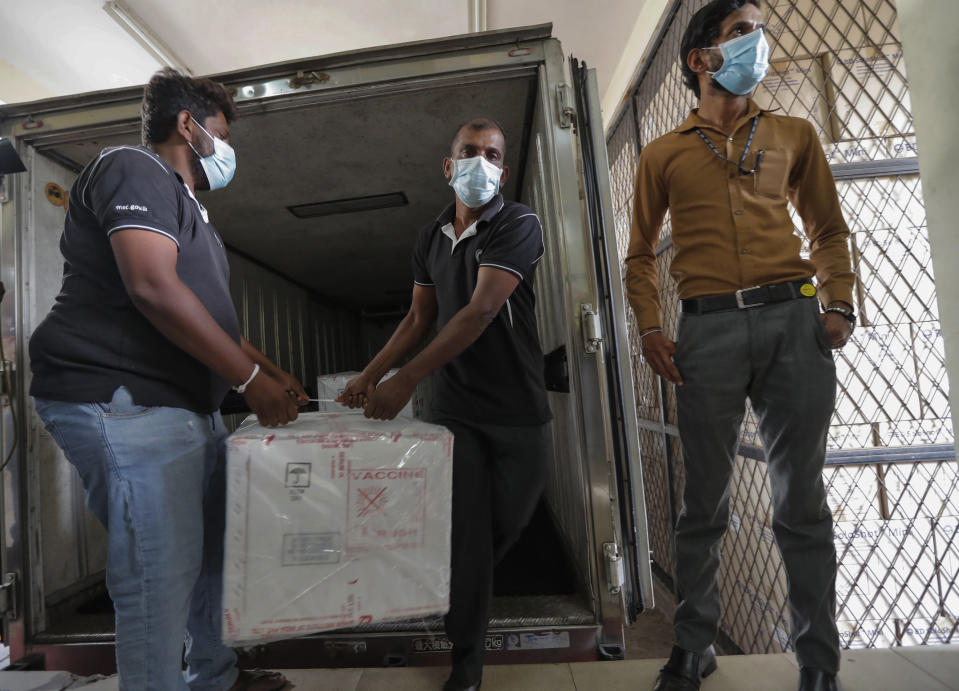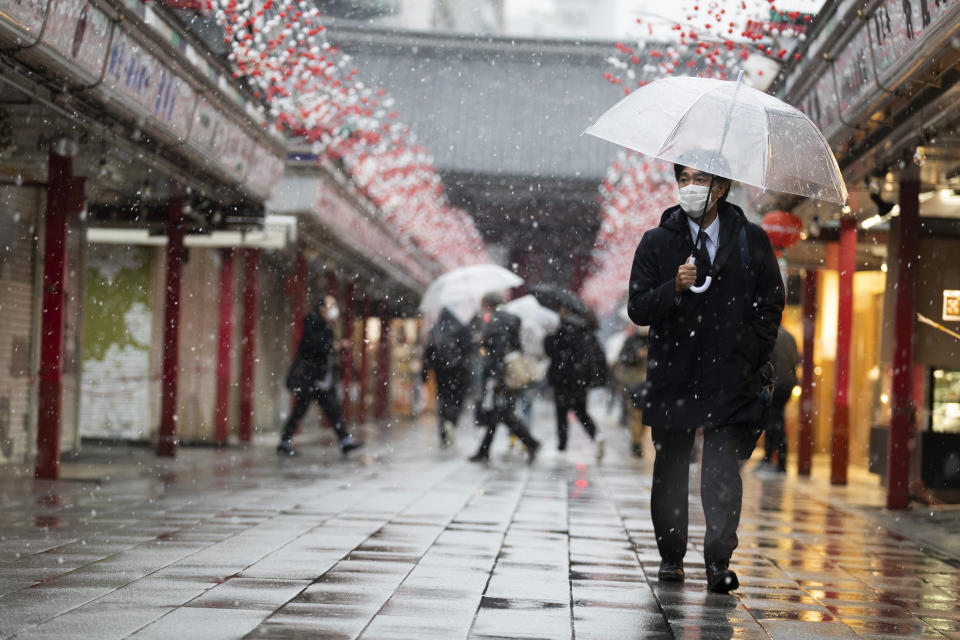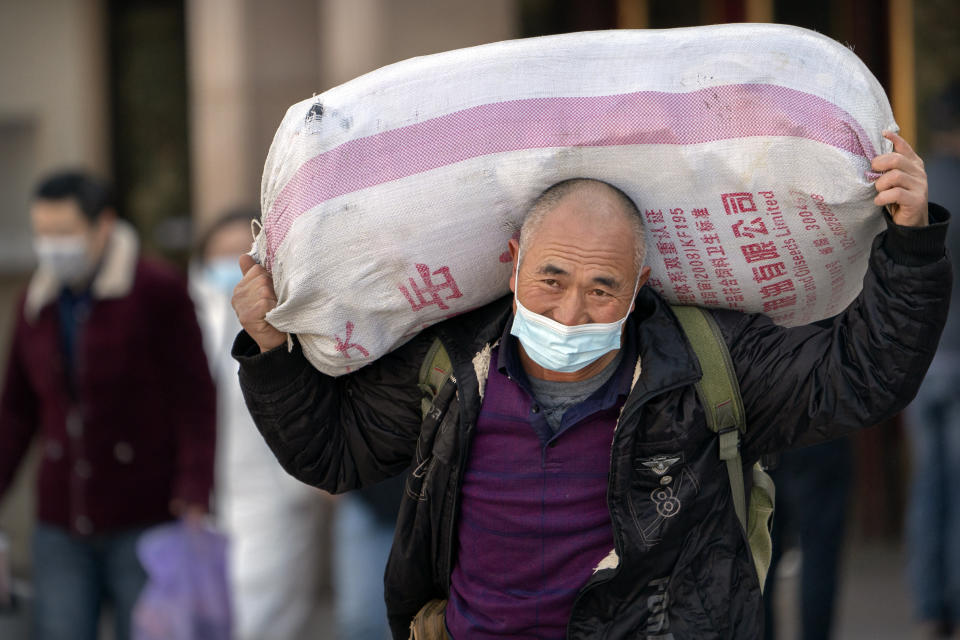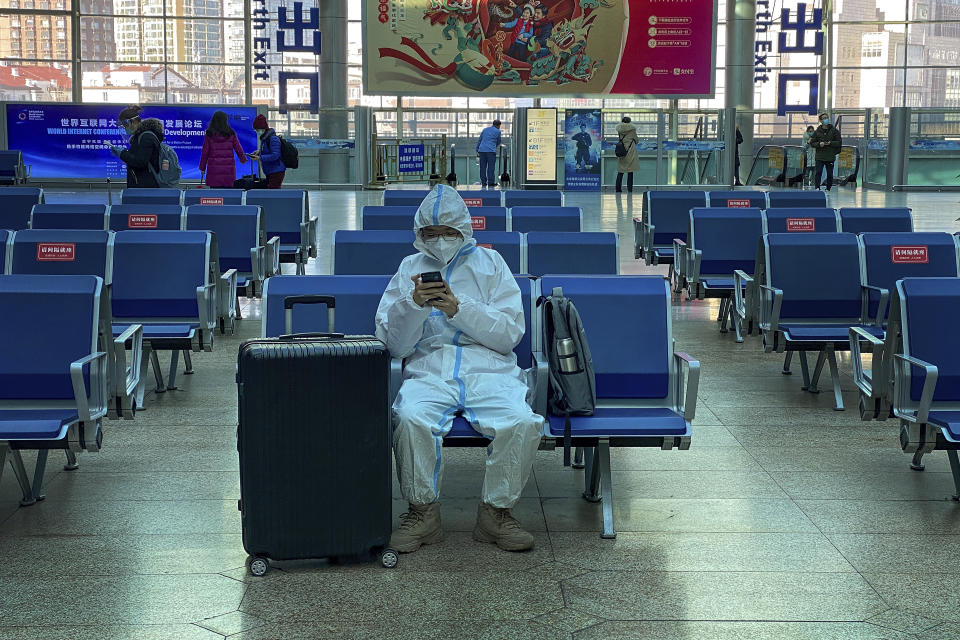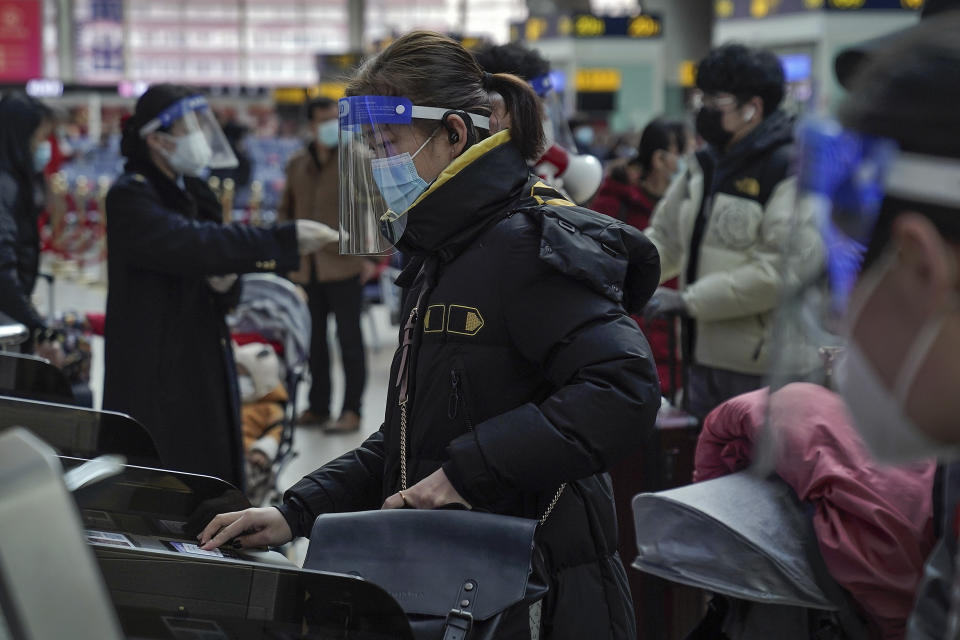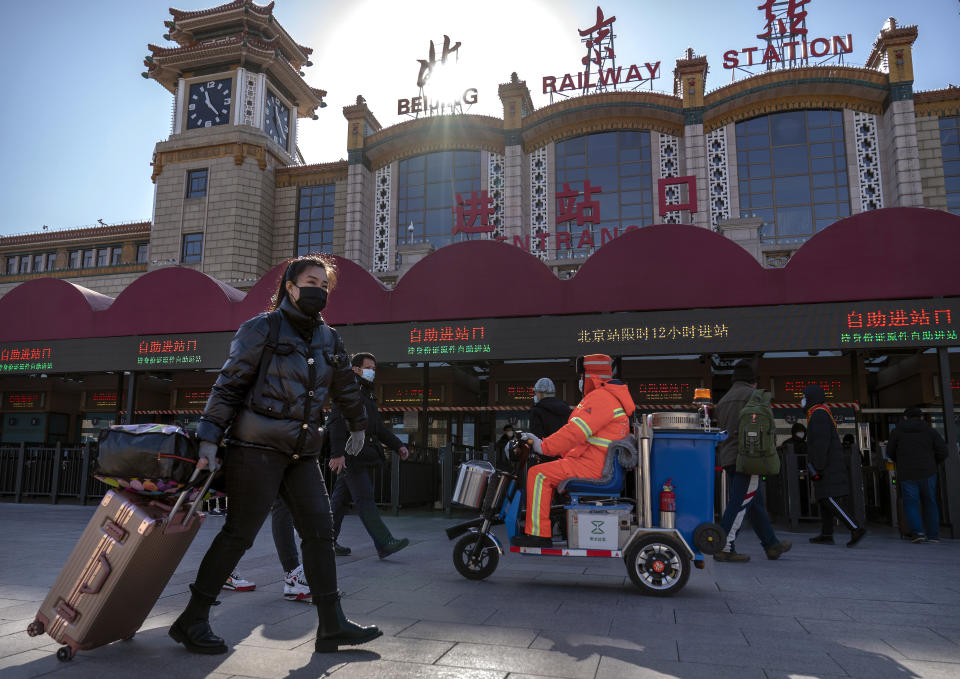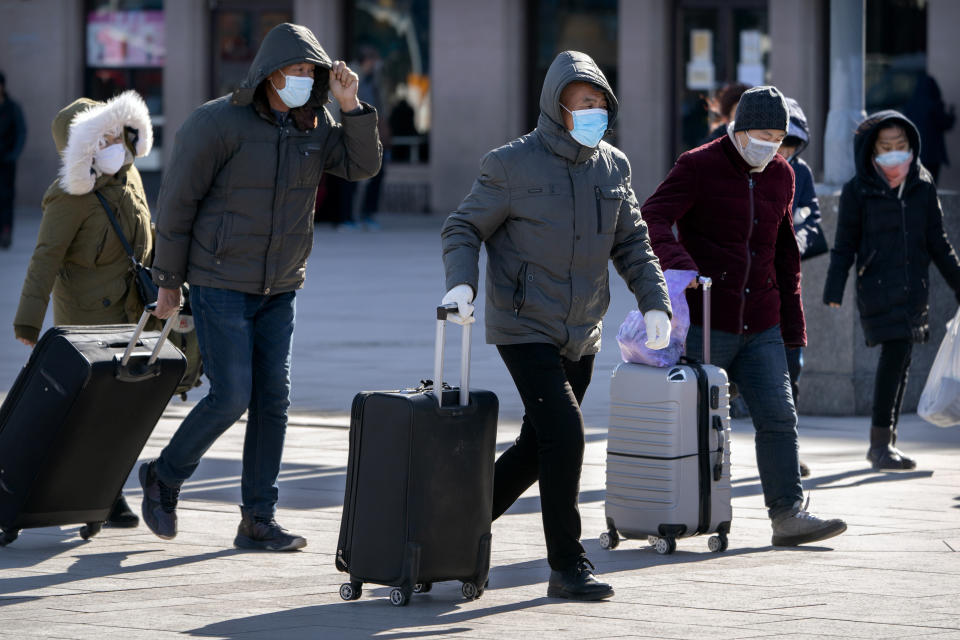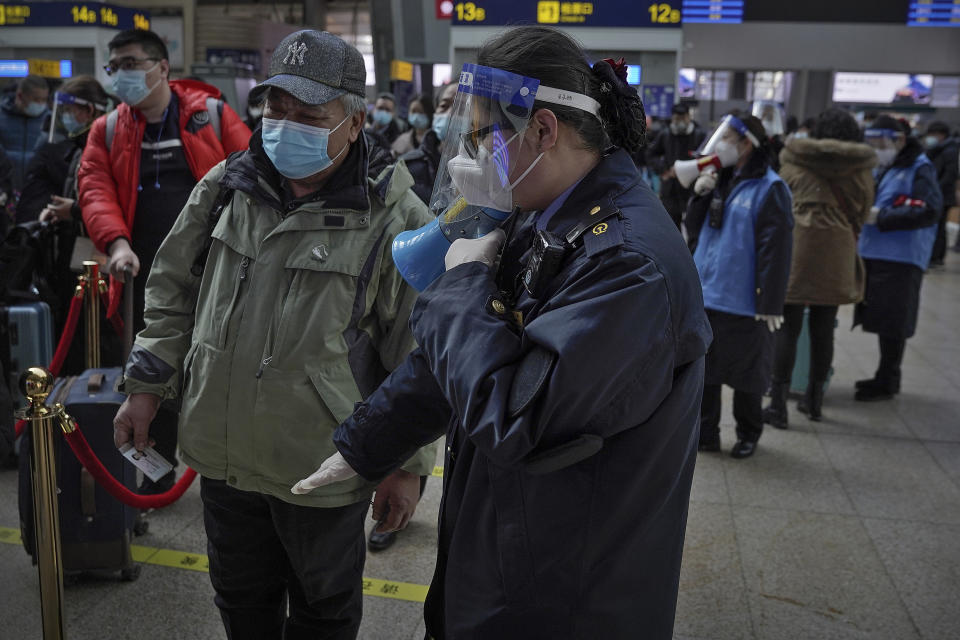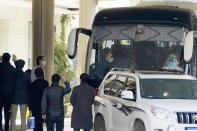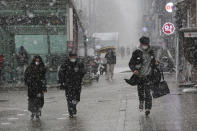Asia Today: China's big holiday travel season light so far
BEIJING (AP) — Efforts to dissuade Chinese from traveling for Lunar New Year appeared to be working as Beijing’s main train station was largely quiet and estimates of passenger totals were smaller than in past years.
Thursday started the roughly two-week travel rush ahead of the holiday that falls this year on Feb. 12, a time when trains and other transportation are usually packed with migrant workers taking what may be their only chance each year to travel home and see family.
At the Beijing station, only about five of 15 security gates were open and the usual lines at ticket windows and passengers camped on the central plaza were nowhere to be seen. China has in recent years upgraded systems along with building the world’s largest high-speed rail network, but passenger numbers have remained heavy.
Failure to restrict travel before the Lunar New Year travel period last year was blamed for the spread of the coronavirus, especially since the central city of Wuhan, where the first clusters of the illness were detected, is a key travel hub that was used by millions of passengers.
This year, authorities have offered free refunds on plane tickets and extra pay for workers who stay put to dissuade travel for the holiday.
Travelers must have a negative virus test within seven days of departure, and many local governments are ordering quarantines and other strict measures for travelers.
Officials are predicting Chinese will make 1.7 billion trips during the travel rush. That is down 40% from 2019. From some destinations, the numbers could be much higher, with departures out of Beijing and the southwestern metropolis of Chengdu down by more than 75% over the period, according to estimates from travel associations.
International arrivals are similarly affected, with virtually all foreigners barred from entering China.
Meanwhile, a World Health Organization team emerged from quarantine in Wuhan on Thursday to start field work in a fact-finding mission on the origins of the virus.
The researchers were required to complete 14 days in quarantine after arriving in China. Their mission has become politically charged, as China seeks to avoid blame for alleged missteps in its early response to the outbreak.
The National Health Commission said Thursday that 41 new cases of domestic transmission of the virus had been reported over the previous 24 hours, a decline from previous days. China has reported 4,636 deaths from COVID-19 among 89,326 total cases.
In other developments in the Asia-Pacific region:
— The Philippines’ top diplomat said Thursday he will go into quarantine and the entire Department of Foreign Affairs headquarters in Manila will be shut down for five days after some personnel tested positive for COVID-19. Foreign Secretary Teodoro Locsin Jr. said he tested negative for the coronavirus but was exposed Wednesday to people who turned out to be infected. “We’re going into lockdown til Tuesday when we test again,” Locsin said in a tweet, without elaborating. The department said in a separate statement that its closure, which starts Friday, could be extended depending on the result of a health assessment. The Philippines has nearly 520,000 confirmed COVID-19 cases, the second-highest number in Southeast Asia after Indonesia, and 10,552 deaths. The government has been negotiating with seven American, European and Asian companies to purchase 148 million doses of COVID-19 vaccines, with the first small batches expected to be delivered next month.
— South Korea will start administering coronavirus vaccines to frontline medical workers next month to kick off a mass immunization campaign that aims to achieve so-called herd immunity to the population by around November. Jeong Eun-kyeong, the country’s top infectious disease expert, said the first available doses will go to some 50,000 doctors, nurses and other health professionals engaged with treating coronavirus patients. The next supplies will go toward some 750,000 residents and employees at nursing homes and mental institutions, and then toward workers at general hospitals, paramedics, contact tracers and quarantine enforcers, which would mean around 1.3 million people will be vaccinated by the end of March. It aims to inoculate enough people to achieve herd immunity — the point where the virus stops spreading — by around November, before the start of the new influenza season, Jeong said. The country is planning to get enough vaccines to cover for 56 million people through deals with pharmaceutical companies and through the WHO-backed COVAX program.
— Vietnam has reported 82 new COVID-19 cases in two clusters, hours after counting its first new local cases in nearly two months. The Health Ministry said 72 are workers at an electronic company in Hai Duong province. One employee's infection was confirmed earlier Thursday after her colleague was found to have the virus upon arrival in Japan several days earlier. The company was closed for disinfection, surrounding communities were locked down and over 3,000 people will be tested. In neighboring Quang Ninh province, 10 people tested positive a few hours after a worker at Van Don international airport was confirmed to be infected. No connection between the clusters has been reported. Vietnam now has counted more than 1,600 cases of COVID-19 with 35 deaths.
— Travelers returning to New Zealand will face stricter rules at quarantine hotels as health authorities investigate how up to three people were infected while they were staying at Auckland’s Pullman Hotel. The people were released before testing positive and were potentially contagious, but testing has shown no evidence the virus has spread in the community. New Zealand has managed to control community transmission of the virus. COVID-19 Response Minister Chris Hipkins said Thursday that as an interim measure, travelers would need to stay in their hotel rooms for the final days of their 14-day mandatory quarantine, and would also face stricter controls around leaving their rooms at other times. Health authorities believe the three people caught the virus from another returning traveler at the hotel. Meanwhile, Australia has extended its suspension of quarantine-free travel from New Zealand for another three days. Australia is requiring New Zealanders to quarantine for 14 days in hotels upon arrival.

 Yahoo Finance
Yahoo Finance 
